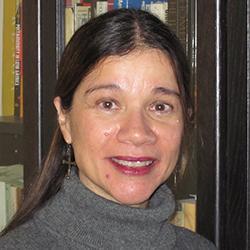Frances Aparicio will lead a discussion on her work covering ‘intralatinos,’ people descended from numerous Latino groups, at noon on Friday.
By Tessa Solomon
tessa-solomon@uiowa.edu
From the Andes to San Juan’s shores, Latin America is a rich spectrum of skin color and culture. Here in the United States, that pool grows more diverse as the prominence of mixed Latino groups emerge. Frances Aparicio, a professor of Spanish and Portuguese and director of Latina and Latino Studies at Northwestern University, examines those groups, dubbed intralatinos, in her upcoming lecture, “Intimate (Trans)nationals: A Conversation with Frances R. Aparicio.” At noon Friday in the IMU River Room, she’ll speak about her research on intralatinos in Chicago and what they represent in not only the United States but in Latin America.
Daily Iowan: Can you explain the topic of your lecture, intralatinos?
Frances Aparicio: I am going to be presenting parts of a book that I am working on and will hopefully finish this year. It is about Latinos in Chicago who are of two or more nationalities. I call them intralatinos because they are descended from multiple Latino groups. For example, Mexi-Ricans: those who are from Mexican and Puerto Rican descent. I interviewed 20 young people in college who represent those diverse combinations, like a Cuban-Bolivian and Chilean-Colombian. I am proposing the family lives of these people are a way of thinking about transnationalism in much more intimate ways.
DI: What kind of questions did you ask, and what reactions did you receive during these interviews?
Aparicio: I started by asking them about their parents , how they met, if there was any resistance from the older generation. And for most of the families, there were strong reactions to have their daughters or sons marry into a different national community.
Then I asked the children whether they’d have any negative reactions from either friends or relatives regarding their mixed nationalities. Most said no at the beginning, but the more they started talking, the more I learned of the different tensions they’ve dealt with. Everything from how their use of Spanish marks them as outsiders to the way they get excluded because of their skin color.
The demographic of Chicago has also shifted toward primarily Mexican, and those who are partly Mexican feel a strong pressure to claim only their Mexican heritage. I conclude that it becomes an issue of choice: which identity to choice and how time affects their choice at that moment.
DI: Why do you feel like this topic is only publicly emerging now?
Aparicio: There is a very strong history of nationalism among Latinos, especially because of the historical imperialism on the part of the U.S.
So given this very strong history, it’s very hard for Latinos to publicly claim more than one national group. But also these interactions have not been acknowledged publicly. There are very few articles about them, but now we are starting to see more novels featuring intralatinos and public figures of mixed descent.
Now, because we have to recognize and embrace that demographic shift here in the U.S, we need to realize that Latinos are not all one model. And as Latinos marry inter-ethnically, the younger generations are going to be mixed. I’m hoping that the book will give voice and help them reclaim their identities in a more public way.
DI: What kind of development have you seen in the relatively new field of Latino Studies?
Aparicio:Latino Studies began in the late-60s with the emergence of the Chicano movement and Puerto Rican movement in New York. It developed as a way to form political consciousness, to combat racism and exclusionism from institutions. Now, it works to include all of of the different demographics in the United States that come from Latin America, not just Puerto Ricans and Mexicans — Colombians, Argentinians, Brazilians, all are emerging communities.
DI: Can you explain why it has been described as a “fragile” university field?
Aparicio: The project of Latino Studies is a project of creating a kind of counter-narrative to the official narrative of the United States. We are really contesting those dominant narratives by virtue of our contributions to this country. But our scholarly work can be seen as threatening to the status quo or only political, not academic enough. Then circumstances are created that make it very difficult to teach and work, so the fields end up disappearing from a campus.
Lecture
“Intimate (Trans)nationals: A Conversation with Frances R. Aparicio”
When: Noon Friday
Where: IMU River Room
Admission: Free



